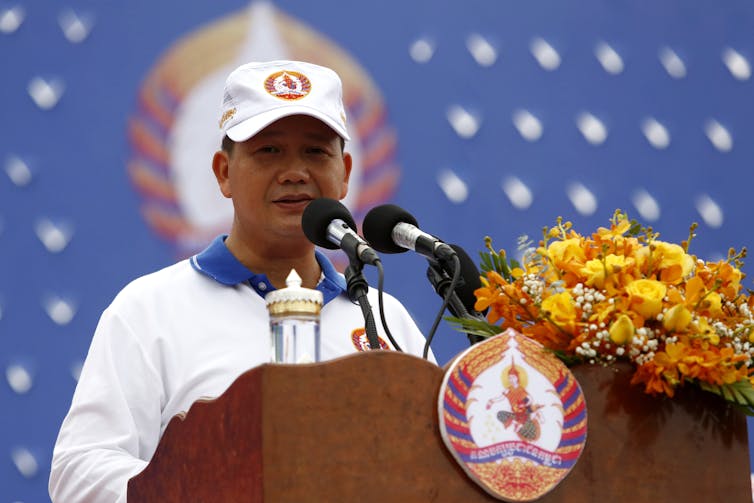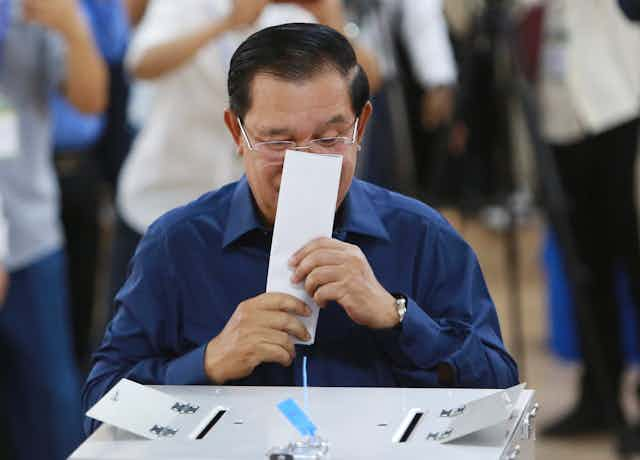Cambodia’s newly re-elected prime minister, Hun Sen, has confirmed he will hand over the premiership to his son, Hun Manet, in August after 38 years at the top of the country’s politics. Hun Sen, who has been at the helm of the Cambodian government since 1985, won a “landslide” general election victory on July 23.
That general election, the seventh of Cambodia’s modern era, was designed to display a transition of sorts back to a multi-party democracy after the country became a one-party state in 2018. The five seats won by the royalist Funcinpec party are claimed to be (token) evidence of this. In reality, the power of the ruling Cambodian People’s Party (CPP) is unfettered.
A common mantra in Hun Sen’s rhetoric is “peace and stability”, something that particularly resonates with the prime minister’s contemporaries. But the reality of life in Cambodia is quite different – barely 10% of its population were adults when Hun Sen first became prime minister.
For the few old enough to remember life before, it was a period of scarcely imaginable horrors – famine, civil war, and the genocidal “killing fields” regime of the Khmer Rouge.
Hun Sen himself served with the Khmer Rouge in the early years of the regime, later fleeing to Vietnam. He returned to Cambodia with the Vietnamese invasion of 1978 and took the position of foreign minister – before, in 1985, becoming prime minister.
A UN Transitional Authority in Cambodia (Untac) was created in 1992 to oversee the Comprehensive Political Settlement of the Cambodia Conflict, with the withdrawal of all foreign forces and the first democratic elections of the modern era in 1993.
That election was actually won by Funcinpec, but Hun Sen rejected the result and negotiated a role for himself as the country’s second prime minister. He consolidated his position with a coup in 1997, and his CPP party has won every subsequent election.
Dealing with the opposition
The biggest electoral shock came in 2013, when the newly formed Cambodia National Rescue Party (CNRP), combining the Human Rights Party and the Sam Rainsy Party, secured 44% of the votes to the CPP’s 49%.
Rainsy, then leader of the CNRP, and Hun Sen have a long-established political rivalry. Rainsy has innumerable convictions for offences including insult, treason and electoral offences – and almost as many pardons. He remains based in France in self-imposed exile.
In 2013, controversy over the results evolved into a boycott of Cambodia’s elected national assembly (the lower house of the bicameral parliament). Eventually, a plan was agreed for the CNRP to share some power in committees and an accord was concluded – but it did not last long.
The CNRP maintained its political momentum. In local-level elections in June 2017, it again secured almost 44% of the votes cast, giving the party a realistic chance of building on this in the next rounds of elections. Political and social debate and opposition were, however, heavily restricted in the run-up to the 2017 local and 2018 national elections.
Political rhetoric from the CPP warned of violence and bloodshed, or even civil war, should they fail to be re-elected. A number of laws were deployed to restrict political commentary, with the CNRP and its supporters often targeted.
One of Cambodia’s main independent newspapers closed in September 2017. Its last front page carried the arrest of Kem Sokha, then leader of the CNRP, on treason charges. Various radio stations were also forced to close, and public debate was restricted and ever more regulated. Electoral law amendments restricted the role of Rainsy and curtailed political opposition.

In November 2017, the CPP used one of those new processes to dissolve the CNRP and redistribute all local-level seats it had won in the June 2017 local election – primarily to the CPP.
While Kem Sokha was arrested in September 2017, it wasn’t until March 2023 that he was finally convicted of conspiracy with a foreign power and treason, and sentenced to 27 years’ imprisonment. He is also banned from involvement in politics. Following the 2018 National Assembly elections, Cambodia became a one-party state, with the CPP winning all the seats.
Read more: Cambodia: treason trials the latest in the country's slide to autocracy
At the 2022 local elections, the CPP secured 74% of the vote. This time, the main opposition came from the Candlelight Party (drawing in part on elements of the former CNRP), which achieved 22%. But Candlelight was disqualified from fielding candidates in July 2023’s national election, due to apparent irregularities in its registration documentation.
Not taking any chances, political rhetoric from the CPP continued to highlight the dangers of voting for opposition parties, and led to Facebook (a widely used platform in Cambodia) considering banning Hun Sen for a video threatening to beat up opposition figures.
A new generation?
Given all this, the general election results have come as no real surprise. With the prime minister handing the leadership of the country to his son, it is expected that many of Hun Sen’s cabinet will also step down and hand over to younger relatives.
Hun Sen has indicated that the transfer of power is part of his plan for continuing peace, stability and development. He will retain leadership of the CPP and remain a lawmaker, assuming leadership of the Senate (upper house) when the incumbent retires. Many commentators expect him to continue to wield influential power over the country and its politics.
While a new generation of political faces may connect more with the youthful population of the country, they may struggle to reconcile the authoritarian state they inherit with the liberal multiparty democracy called for by Cambodia’s constitution.
The true test of stability in a democracy is, arguably, continuity during a transition of leadership and change of governing party. With Hun Sen choosing to step aside now, there are five years for Hun Manet to shape his power before the future of the CPP is tested in the next set of elections.

